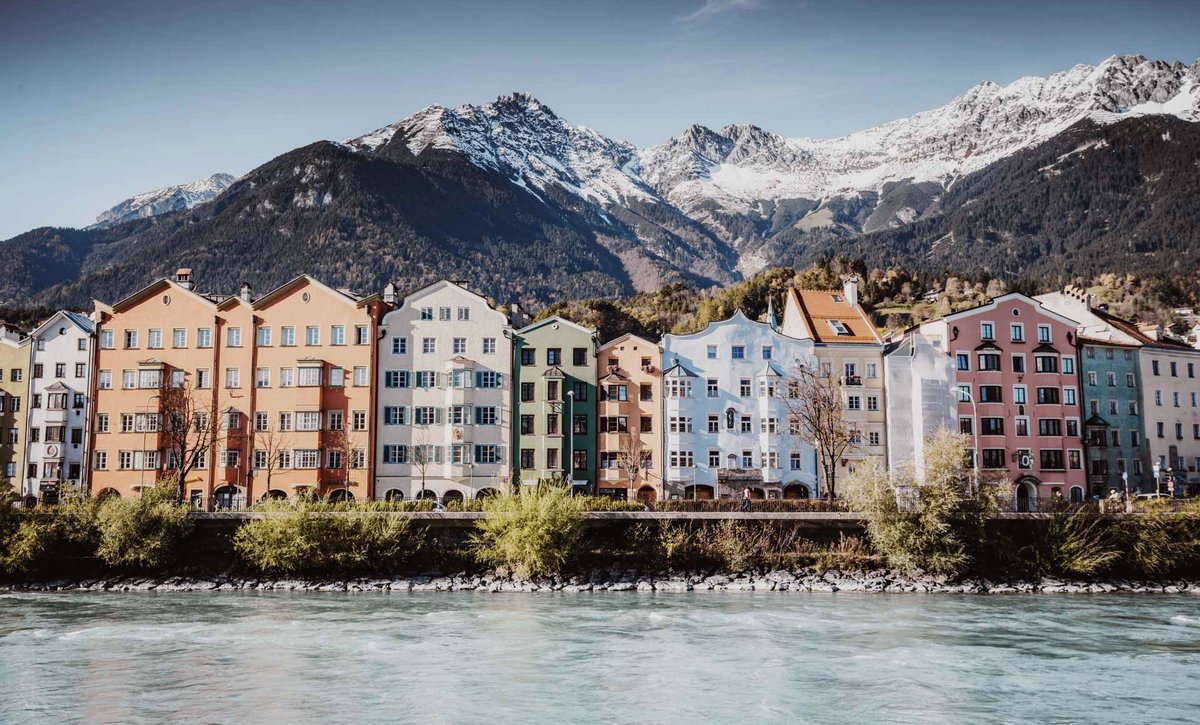Bavarians and French people fought for Tirol over centuries.
My great-great-great-grandfather and a guy named Andreas Hofer prevented that. Since then Innsbruck is a cool hippie city and some people let their beard grow long in honor of Hofer. In honor of Hofer the city built a museum at Bergisel. You can reach it easily, as well as the golden roof and the imperial palace. The best public transport in town is... you. You can reach everything by feet, and that’s good for your health too! Of course! Believe me!
In Summer you can find a cosy place to sit in the hearth of the city. In the Maria-Theresien-Straße, in the old town, or in a beautiful open-air restaurant. Do not sit on the stone wall above the river Inn. You could be confused with the students. With the real students!
If you wear sport clothes, you should be in good shape. Almost every Tyrolean is sporty. You will see them biking, hiking, in Alpine pastures or in the mountains... So keep it easy.
For business and smalltalk we have one more suggestion for you. Nod your head if a tyrolean guy explains you something and emphasizes it with a „Gäh?“. And add a guttural, throaty, rolling „ccchhhkkkrrr“ sound if you are asked how tyroleans spell the german “Banane” (banana). Yes, with “ccchhhkkkrrr“ at the end. I will explain you the meaning of this sentence drinking a beer at the bar...
City. Nature. Variety. Binder’s.
Golden Roof
The most famous landmark shines in the middle of the old town. 2.657 fire glided copper tiles give the alcove balcony its name. For more than 500 years the construction dominates the other medieval houses and shady access balconies. Its builder, the Emperor Maximilian, enjoyed the view: He could see the colorful activity of his city, he could enjoy the knight tournements and let people pay homage to him.
Visitour could see the shining golden roof entering the old town. However, it’s worth it to have a closer look, since the fundament is richly ornamented. All kinds of figures and representations decorate this construction. Among these you will find many curiosities.
City tower
Look at the roofs of Innsbruck from the top, like a medieval tower guardian. For almost 450 Years they looked out from the city tower and warned the citizens of fire and other dangers. The lower floors were a prison. After 133 steps visiors arrive to the 31 meter highviewing platform. From here they do not only see the small lanes, but also Bergisel, Patscherkofel, the river Inn and the Nordkette.
Innsbruck’s cathedral
Already in 1180 Innsbruck’s cathedral was mentioned for the first time. The cathedral’s name is actually St. James. From that moment on rose the majestic tower above the roofs of Innsbruck and it is part of the most important medieval pilgrimage for Christians: the Way of St. James.
Maria-Theresien Straße
Strolling, shopping, sitting in the cafés and meeting friends. Magnificent baroque buildings and the beautiful panorama of the city will amaze you at the same time. That’s what Maria-Theresien-Straße nowadays is. At the time of its foundation more than 700 years ago here, in the new city, there were only a few farmhouses. But life took the old city over!
Triumphal arch
A roman-inspired triumphal arch surrounded by the modern city life and timeless, impressive mountains: The Triumphal arch is one of the most important landmarks of Innsbruck. Like an ancient triumph arch, it shows Innsbruck’s history.
But it isn’t that old, after all! The baroque construction was built by order of Maria Theresia in the 18th Century.
Nordkettenbahn
Die Nordkette: Das Juwel der Alpen. Passt ausgezeichnet zu Innsbruck, der Hauptstadt der Alpen. Denn sie veranschaulicht eindrucksvoll deren schönstes Attribut: Die alpin-urbane Verbindung von natürlicher Bergwelt und pulsierendem Stadtleben.
Hofgarten
Der Hofgarten ist die grüne Lunge im Herzen von Innsbruck. Er grenzt an die kaiserliche Hofburg und liegt nahe der Talstation der Nordkettenbahnen. Such dir ein kühles Plätzchen zum Entspannen oder für ein Picknick? Dann setz dich auf eine Bank im Schatten alter Bäume und sehe dem Treiben zu.
The Tirol Panorama
“The tyrolean legend” is explained in the TIROL PANORAMA from different points of view and it gives an insight into this complex and interesting subject. The giant panoramic painting with its 1000 square metres shows at 360° the tyrolean fight for freedom.
Bergisel
With the in run a bridge, the tower a building and the tower head a steel construction the Bergisel Ski Jump, reconstructed in 2001, is a ingenious combination of all different types of architecture. Responsible for this masterpiece of architecture ist he Iraqi architect Zaha Hadid, who made her mark designing the Tomigaya Zaha Building in Tokyo, the Rosenthal Center for Contemporary Art in Cincinatti the extension of the Reina Sofia Museum in Madrid.
Ambras Castle
Ambras Castle is one of the most important landmarks of Innsbruck. Its cultural-historical significance can’t be separated from the Archduke Ferdinand II, (1529-1595). He was a Renaissance prince who promoted art and science. He founded the magnificent Ambraser Collections, for which he built a modern museum in the lower castle.
Patscherkofel
The Patscherkofel is a 2246 metres high peak of the Tux Alps. It is considered the local mountain of the city due to its proximity to the provincial capital, Innsbruck.
In the municipal district of Patsch, at the northern entrance of the Wipptal valley to the Brenner, the Patscherkofel stands with its woodles peak as the most prominent landmark of Innsbruck. On the mountain there is the Patscherkofel transmitter.
Nordkette
The Nordkette: The jewel of the Alps It perfectly matches Innsbruck, capital of the Alps. The Nordkette shows proudly its most impressive and beautiful attribute: The alpine-urban connection of natural world and vibrant city life.



